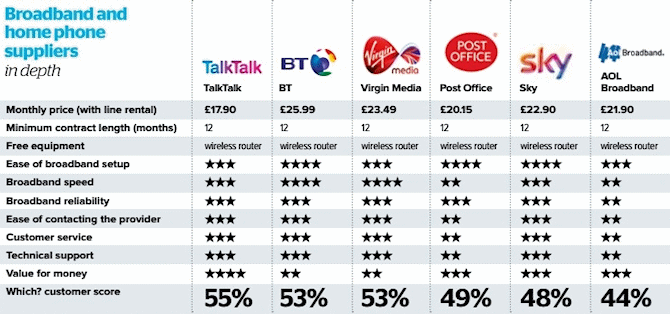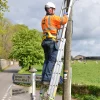UPD Which? Awards the Best UK ISPs and Seek Broadband Speed Guarantee

Consumer magazine Which? has today praised smaller broadband and phone providers for their quality, called for all ISPs to offer a Broadband Speed Guarantee to customers and awarded its coveted Recommended Provider gong to The Utility Warehouse and John Lewis in their latest consumer satisfaction survey. Zen Internet and PlusNet also won ‘Recommended’ status under the broadband-only section.
The consumer satisfaction survey, which rates a popular selection of the UK’s broadband and home phone suppliers, found that smaller ISPs top the table for customer service and Internet speeds. Meanwhile most of the largest ISPs could be found languishing at the back.
Advertisement
It should be noted that the survey’s prices exclude introductory offers, includes the cost of line rental (claims to list the cheapest bundle packages) and appears to be based on feedback from a December 2013 survey of 947 customers (n/a rating means they didn’t receive enough responses). In addition, the ‘customer score’ combines overall satisfaction and likelihood to recommend to a friend.


It’s interesting to note that EE, BT and TalkTalk appear to be rated more highly than Virgin Media and Sky Broadband, which is the reverse of what we tend to see in most other studies (examples here, here and here) and not to mention Ofcom’s quarterly complaints summary (here).
Advertisement
As a side note it’s also important to reflect that Which? has a separate section of awards for standalone broadband providers (excludes phone services). In that category Zen Internet and PlusNet came top as Recommended Providers with a customer score of 87% and 73% respectively. Meanwhile AOL was last on 34% and Virgin Media secured just 53% (sadly we don’t know where the others came).
A Call for Change
As part of today’s consumer satisfaction survey Which? has also published the results from a new Populus poll, which interviewed 2,012 UK adults online between 8th and 9th January 2014. The study revealed that 63% of people still experience problems with their broadband connection and 45% claim to suffer slow download speeds (58% said they experienced this frequently or all the time).
Poor customer service tends to be another common issue, with 31% of those who contacted their provider with a problem saying they didn’t get a resolution; meanwhile 25% of those who did get a resolution were dissatisfied with how long it took (20% had to contact their ISP three times or more before their issue was fixed). Worse still, some 27% of those who had reported a service outage said it took two days to fix and 11% claimed to have been without Internet access for a week or more.
As a result Which? has called on ISPs to offer a Broadband Speed Guarantee and not to charge consumers when their internet service is down (or refund broadband charges). Plus if a customer doesn’t have internet access for two weeks then it believes they should be allowed to leave their contract without penalty.
Advertisement
Which? Wants Broadband ISPs to:
1. Give customers written speed estimates at the start of the contract.
2. Allow people to exit contracts without penalty if they don’t get that speed.
3. Fix loss of connection as quickly as possible and refund people for loss of service.
4. Cut out the jargon – give consumers information they understand and take responsibility for fixing problems.
However what Which? fails to reflect is that most protracted fixed line broadband outages occur as a result of problems on BTOpenreach’s network (rarely the ISP itself) and, unless a rival infrastructure exists in your area (unlikely outside of most towns and cities), then leaving your contract won’t get the problem fixed any faster and might cause additional confusion.
On top of that Ofcom’s Voluntary Code of Practice on Broadband Speeds means that customers can already leave their ISP, without penalty, within the first 3 months of a new contract if a significant problem with their speed cannot be resolved. NOTE: ISPreview.co.uk understands that Ofcom are currently revising this and will release an updated code in a few months’ time.
On the other hand it’s worth remembering that if you want any kind of true guarantee for speed and quality, which is already difficult enough on variable copper-based phone lines, then consumers could always take a proper uncontended leased line with a Service Level Agreement (SLA) but you’ll pay through the nose for that.
Consumer broadband services would benefit from better protection but it’s important to remember that such products are “Best Efforts” and only affordable because the capacity is shared between many users. The same support/quality/performance as true business connections enjoy generally don’t exist for pure home packages. Standards could always be raised but prices will go up too.
UPDATE 10:43am
We’ve had a few comments from ISPs in reaction to the new campaign.
Joe Lathan, Director of Broadband at Virgin Media said:
“With the fastest broadband speeds and the highest customer satisfaction according to Ofcom, we welcome Which? joining our long-standing call for greater transparency. We know how important broadband is to people which is why we continue to boost speeds for our customers. Broadband from Virgin Media is five times faster than BT’s regular broadband and we regularly deliver speeds even faster than we advertise.”
Boris Ivanovic, Chairman of Hyperoptic, added:
“Hyperoptic applauds this initiative from Which? for broadband providers to be more transparent with consumers. However, if a consumer gets their broadband through a twisted pair telephone line, speeds will always be subject to distance attenuation and interference. Even FTTC is not a true fibre connection and is still delivered through old telephone lines, which are still subject to same physical limitations. Consumers still experience unstable speeds, slower service during peak times, and discrepancies between upload and download speeds. The fact is to provide futureproof hyperfast symmetric services, and guarantee speeds, the only answer is to provide broadband over true fibre such as FTTP/B.
Having a direct fibre connection gives consumers an hyperfast and reliable service that supports modern life, as well as tomorrow’s service. A 50GB game, which is typical on Microsoft’s Xbox One and Sony’s PlayStation 4, would take over 8 hours to download on an average UK line of (true) 14Mbps and less than 7 minutes on a FTTP/B 1Gbps connection. Netflix’s “House of Cards” will be broadcast this year in 4K with each 1-hour episode having 20GB to 30GB or around 200GB for a season. That one season of House of Cards would take 4 days to download on a (more realistic) 5Mbps line and only less than half an hour on a 1Gbps connection.”
Mark is a professional technology writer, IT consultant and computer engineer from Dorset (England), he also founded ISPreview in 1999 and enjoys analysing the latest telecoms and broadband developments. Find me on X (Twitter), Mastodon, Facebook, BlueSky, Threads.net and Linkedin.
« Gigaclear Confirm Otmoor in Oxfordshire Next for 1Gbps FTTP Broadband























































Comments are closed